- Home
- Sherwood Smith
Zapped Page 2
Zapped Read online
Page 2
Kyle looked around furiously. I sat where I was, feeling his gaze go right past me. At the end of class, he said to the boy who sat behind me, “Michael, you suck-meister—”
Michael cut in. “Wasn’t me. I never use anything but these.” At the edge of my vision, I saw a scrawny hand holding out a mechanical pencil.
Kyle loomed over him. “You were laughing the loudest.”
“Because it was funny,” Michael said. “Everybody else thought so, too.”
Kyle shoved past Michael and practically leaned across my desk to glare at the blond boy with the peeling nose who sat at my right. Before Kyle could even speak, the kid protested, “Hey, it wasn’t me. I was texting under my desk.”
Kyle grunted. “Did you see who did it, Jason?” And when the blond kid shook his head, Kyle finally moved away from my desk to glower at the rest of the boys in the back. “Who saw? Anyone?”
I got out of there. Obviously girls were invisible in Kyle-Land, except as targets.
I gloated to myself the rest of the day. Until the next morning, when I got to math class, and there were two empty seats: Kyle’s and the seat right behind mine. The atmosphere in the room was really creepy, kind of tense, with people whispering excitedly the way they do when something terrible happens.
Mercy sat at her seat, her head so low it was like she was bowed over her notebook, as behind me, someone whispered to the kid I’d followed in, “Did you hear what happened to Michael Abrams?”
“No.”
“Someone jumped him after school. He’s in the hospital.”
“In a coma, that’s what I heard,” someone else put in.
One of the boys said, “And Kyle is in juvie, being questioned—“
The door opened, and the teacher walked in. Everyone fell silent.
She looked around, then said in a terse, low voice, “If any of you witnessed the altercation, please go to the office, or you can call the police directly. No! I don’t want to hear your comments, and I am not taking questions. Now get out your homework…”
I sat there, listening to my heartbeat whoosh in my ears. All I could think was, It’s my fault.
I knew better. I kept thinking that as my body went through the rest of the school day like a robot. This was ten times worse than cheating at basketball.
I knew what bullies were like. Dad had warned me in fourth grade that bullies were another name for angry people, and angry people just get angrier. It’s not like the movies, where they learn their lesson. “The only lesson they learn is how not to get caught,” Dad had warned, and he’d taught me bully-avoidance blending in.
I fell into such a fog of gloom that I forgot to copy down the homework assignment in biology, ran back to snap it with my phone, discovered the teacher had already erased the whiteboard, so I had to chase a classmate, with the result that I was late to the one class where the teacher was a dragon about lateness.
And so, I, Laurel Ibberts, the careful good student, landed in after-school detention.
At least I got all my homework done, and when I left, the hot autumn winds had died down a little. I wasn’t used to the white-hot glare of a Southern California autumn.
When I got to the top of the palisade where the bus bench was located, I turned to look at the hammered silver-blue glitter of the ocean as the sun began to set. I’d been told not to be out after dark, as the school was in an older part of the neighborhood and not all that safe.
Movement caught my eye: somebody walking fast on the other side of the street, glancing over her shoulder. Fuzzy pale hair swung above an extra large sky blue t-shirt and baggy jeans: it was Mercy. She was being followed by a bunch of older teenage girls. I saw gang-banger tats on one girl’s arms, and another was swinging a crowbar.
My stomach instantly started boiling. What should I do? But when I looked back, Mercy had ducked around the side of a pawn shop maybe fifty yards away from my bus stop. And then—from my angle, I was the only one could see her between the pawn shop and the liquor store next to it—a twinkle of light made me blink. Through that twinkle Mercy leaped about twenty feet, straight into the air. She landed lightly on the roof of the car repair shop.
Magic? Energy torqueing weirdly? I knew that twinkle.
While I goggled in total amazement, the gang-bangers rounded the corner of the pawn shop, looked around, and hustled down the street, right beneath Mercy, who watched them from above.
She lifted her head, and I would have sworn she stared right at me, though it was hard to tell, the way her glasses flashed, reflecting the low sun. Another tiny flash and she leaped down from the roof, landed like she was a feather, and half-lifted a hand to me.
Then she ran up the street in the other direction, until she was out of view.
The bus rumbled up and stopped with a hiss. I climbed on like a robot.
* * *
People used to ask me these weird little questions about my parents, until I figured out that they wanted to know how it works, with three.
Mom Gwen and Mom Tate have been together since they were roommates in college. If they could have gotten married back then, they would have. Mom Tate took art, and Mom Gwen studied pre-med, then went into the Navy so she wouldn’t end up with a student debt of a quarter of a million bucks. She liked the Navy, so she stayed in as a doctor, working Naval medical centers as a pediatrician.
They met my dad when he was just getting out of the Navy—he also went in so he could go to college debt free—but when he finished his eight years, he quit the high-stress world of analysis to get a job as a math teacher.
Around that same time, my bio mom dumped him and vanished when I was about a year old. Dad met Mom Gwen at the Navy base when he took me in for baby well care, they fell in love, and somehow the three of them worked it out so they had a handfasting marriage on the summer solstice.
For legal purposes Mom Gwen and Dad married so we kids would have coverage, as she was pregnant with Josh by then. Mom Tate gave up her crummy job behind a counter and took over childcare during the day, the others covering at nights so she can paint. They never celebrate that courthouse wedding for only two, which they call the ‘signing.’ Their anniversary is the summer solstice.
“Mom,” I said that evening. “I have a question.”
They were both there, Mom Tate cooking dinner and Mom Gwen sorting the mail, but somehow they always know who we mean. Or else they both answer. “Yes?”
“So there’s this assignment. A kind of what if scenario. Like, what if people turned out to have powers?”
“Powers?”
“Like…” My voice slid around my zap. “Like the X-Men, or Harry Potter.”
“Nobody has any kind of powers. There are a lot of frauds out there, and seriously disturbed people.”
“But if they did. What would happen to them?” And when Mom Gwen looked at me as if I’d painted my face green and began hooting like an owl, I said quickly, “For this what-if essay.”
“It sounds to me like they want you to write science fiction,” she said disapprovingly.
“Or fantasy,” Mom Tate put in over her shoulder. “Hey, you could write your own manga. Use your drawing skills!”
“Um, this is about learning about alternative viewpoints and cultures,” I lied frantically. “So let’s say someone discovered that magical powers really exist.”
“Oh! Well. First bona fides would have to be established. Tests, blind studies, and of course it would depend on what these powers were. If they could harm anyone. The government would probably demand oversight, at the very least, especially if you’re talking about Fairy Godmother powers, instead of someone who can, I don’t know, say ‘Alakazam’ and blow bubbles from their belly button.”
“The politicians would want a piece of them, of course,” Mom Tate put in, as she stirred something delicious-smelling in a pot on the stove. “Think of the growth industry in magic!”
They took off with that idea, straying into politics like adult
s love to do. As soon as I heard “Yeah, but the Republicans…” and “But the Democrats…” I tuned out.
I’d heard what I needed to: tests, blind studies, governmental oversight.
I didn’t dare tell anyone. I was on my own with this.
The next day at school, I got to math as early as I could. All night I’d tossed and turned, imagining what Mercy would say, what I would say. What would happen.
Though we both took Japanese, I was a year ahead, having been able to take it in middle school in Hawai’i. So we only had math class together.
I got a real jolt when I walked in and there was Kyle in the back row, his chair tipping back dangerously. Everybody talked around him, like there was a force field circling his chair, except for two buddies sitting on either side of him. I slunk to my seat and sat down, not daring to look back.
When Mercy finally appeared, she barely looked at me. Just sat down, opened her books like usual, and bent over her work.
The teacher came in and pointed at the first row, the seat directly in front of her desk. Kyle sauntered up, his pants sagging so low they were nearly around his knees, and slammed his books down on the desk, the noise like a rifle shot.
The teacher said, “Do you really want a trip to the vice principal’s office? Because we can get that over with right now. Everyone else is here to learn.”
“I’m sitting, I’m sitting,” Kyle said, and dropped into the chair, his long legs reaching out into the aisle between the seats. He hunched over, the way his gaze shifted around making him look so guilty it was like he was already in jail. After class, I got stuck behind a clot of students, and lost sight of Mercy.
At lunch, I ate at the Alliance room as usual. When the bell rang and I walked into the stream of people going to class, suddenly Mercy was there beside me, her fluffy hair framing dangling earrings that matched the light blue of her eyes.
We walked a few steps. It felt like about a mile, I was so uncomfortable, like, was she going to bring powers up or should I? So I said, “You’re really a really good dancer.”
“Thanks.” Her expression lightened for about a nanosecond. “I love dance. More than anything.” Then she was serious. “You didn’t blab.” Her voice was so soft I almost couldn’t hear her.
I looked at her in surprise. We were exactly the same height, so I gazed right into wide, expectant pale blue eyes behind those glasses. My gaze dropped, because I’d learned that though you’re crammed in with a million kids, you don’t look directly at anyone else unless you’re popular, or want trouble. “Nobody’s business,” I said, wondering where this was going.
Then ice jolted through every nerve in my body when she said, “I saw you flash that pencil. And everybody was talking about the amazing basketball star who lasted a week.”
If it had been anyone else, I would have said, “What?” But there was that twenty foot leap.
I said, “He had it coming.”
“Michael didn’t,” she replied. She grimaced and waved a hand as if to erase her words, then said quickly, “There are others.”
My heart nearly exploded in my chest. I gulped for air, unable to say anything.
She didn’t wait for me to react. “We meet at the gazebo at Embarcadero Marina Park. Tomorrow, at four. You can get there easy if you have a bike.”
Then we reached an intersection, and she turned off to another hallway without another word.
* * *
I took my bike to school the next day, and afterwards, used my phone to guide me. The park was located on a narrow finger of land that stuck out into the bay.
I found the gazebo, and spotted Mercy’s frizzy hair and oversized buttercup yellow tunic tee, with golden dangling earrings to match. With her, to my total surprise, was Harper, the vice president of the Alliance. Tall, thin, and awesome-looking, she wore her black hair in a kind of crazy pixie style. Her heavy make-up emphasized her Asian eyes. She always wore black lace fingerless gloves, and silver snake armbands. Her goth style was what you’d expect to see from someone who did not want, ever, from any angle, to be overlooked as Normal. She was cool, she was popular, and she was a junior.
I’d tried to draw her.
So here she was now, sitting at the other end of a bench from a guy whose sideways cap hid his eyes. He slumped down, his saggy pants halfway to his knees. Sitting across from them, on the same bench as Mercy, was a girl even scrawnier than Mercy, wearing a Catholic school uniform.
Harper said to me abruptly, “You’re Laurel Ibberts? Supposedly you have a talent?” She sounded almost hostile, but then she leaned forward a little, eyeing me, then her tone got about five levels friendlier as she said, “Haven’t I seen you at Rainbow?”
“You mean the Alliance?” I said. “I joined the first day of school.”
“We used to call it Rainbow, but that got voted out,” Harper said, still friendly. “Keep forgetting. So you have a talent?” She waved at the others. “We meet here partly so nobody can nose in, but also in case we have to prove ourselves to someone new. Fletch, tell her what you can do.”
The guy tapped his nose. “Give me something you’ve touched. Then give me half an hour while you run. I’ll find you.”
Harper held up her gloved hands. “You could call mine psychometry. I see memories. Bec there turns unnoticeable, as long as you look with both eyes. And don’t touch her. “ Bec looked at me then looked away as she chewed on a hangnail. Eugh.
“So, Laurel, what’s yours?” Harper asked me.
I looked around. Some slob had littered a soda can on the walkway. I zapped it to my hand, and then to the trashcan by the gazebo entrance; when I did the zap, I saw all their eyes widen at the tiny flash of light.
Fletch sat up a little straighter. “That one is seriously cool.” He turned to Harper. “I sure hope you can figure out if, and how, we can learn other people’s talents.”
I am pretty sure my mouth was hanging open as Harper said to me, “Does anyone in your family have a talent?”
I shook my head.
“Where were you born?”
“Hawai’i. Naval base.”
Harper leaned forward and said, “Did you know there were others?”
“Not until yesterday, when she showed me her leap,” I said, nodding at Mercy.
Harper shot a dead fish eye in Mercy’s direction, then lifted her chin as if tossing something away. She said flatly, “Okay, good find.” And to me, “You probably have a lot of questions, but first let me ask one more. Have you ever heard of Sorsam?” And when I shook my head, she pulled from her purse a glittering silver chain necklace, with a peculiar charm, shaped like a very fancy S, only made with three intertwined almond blossoms.
“Wait,” I said. “I think … I think I’ve seen something like that. On a picture my dad has, of my bio-mom. We only have a couple photos. But in one, she’s wearing it. She was pregnant with me.”
That hit them all, and Harper nodded. “We think that ‘Sorsam’ is some kind of investigative body, or scientific group, or maybe a group of talents. Whoever runs it, or recruits for it, is keeping it a dead secret.”
“The operative word here,” Fletch said, “being dead. As far as we know. Which is why nobody wants to do a serious net-search on Sorsam.”
Harper shot him a look, and he sighed and slumped back again, as she went on. “Something happened around fifteen years ago. We all had a parent or a relative who was part of Sorsam, and who disappeared. My uncle, Bec’s mom—”
“My grandmother,” Mercy said.
“—Fletcher’s dad. They must have done something, or something was done to them, before they disappeared, but we all were born with talents. I think I’ve found a few others on the Net. But I have to be careful in searching for them.”
“Why?” I asked, looking around as if spies would pop up in flashes of light. “Oh. Right. Because those people disappeared?” Was it possible my bio-mom didn’t dump me, that she got taken away?
Fletch said, “W
ould you want to meet whatever made them go…” He snapped his fingers.
My shoulders tightened. “No.”
“So far, it’s all kids under eighteen, and all had a family connected with Sorsam. That’s all we know so far.”
“In the meantime, we four have agreed on two rules. One, whoever else we tell about our own talents, we don’t share anything about anyone else.” She gave Mercy this snaky look, and raised her voice a little as she said, “I haven’t even told my girlfriend Avery. Not about this. None of us want to end up as governmental lab rats, even if Sorsam come looking for us.”
I nodded. “Ahead of you there.”
Harper went on, “Our second rule is: do no harm. We’ve only been meeting since spring semester. But we all agree we should pool our talents to help the community in some way. Michael Abrams is gay, so I think what happened to him is a hate crime. I intend to find out who did that to him, and if it was Kyle Moore—who swears he didn’t, and his brother swears Kyle was with him all afternoon that day—if it was him, whoever it was, I will get justice.”
Everybody agreed, with me nodding fervently.
Harper went on. “I’ve tried twice to get close enough to Kyle Moore to read his memories, but I have to have skin to skin contact for my talent to work, and he’s all covered up in those flannels and saggers, plus he hangs out in the middle of a crowd. And his mother has been right outside school to pick him up at the last bell. So Michael is the next best thing. I need to get into Balboa Hospital.” She turned to Bec. “Would you be willing to hide me?”
Bec looked terrified, her lips moving, “I’ll try.” I could barely hear her.
“Hey, my mom does rounds there,” I said. “She’s a doctor.”
Harper’s lips parted. “This is awesome. Could you get me in? All I need is five seconds.” She pulled her glove off and flashed her palm.
“If we can convince her that it’s something for school, I think I can,” I said. “I don’t know about getting in his room. I know they are strict about that. But I can get you to his floor.”

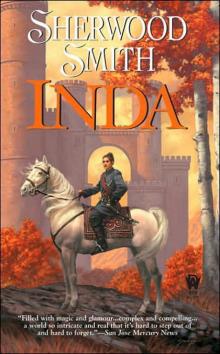 Inda
Inda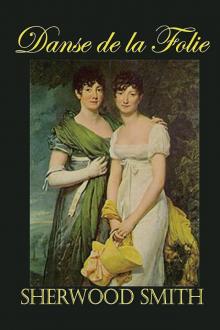 Danse De La Folie
Danse De La Folie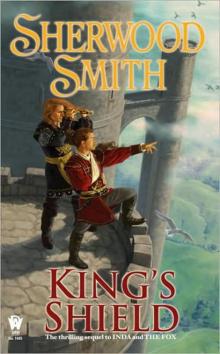 King's Shield
King's Shield Whispered Magics
Whispered Magics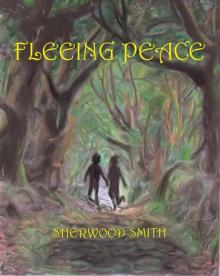 Fleeing Peace
Fleeing Peace Barefoot Pirate
Barefoot Pirate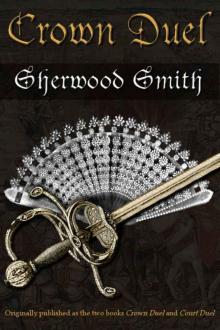 Crown Duel
Crown Duel Mearsies Heili Bounces Back
Mearsies Heili Bounces Back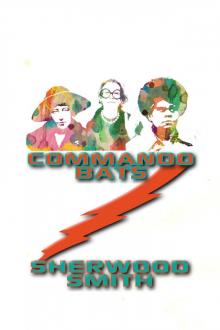 Commando Bats
Commando Bats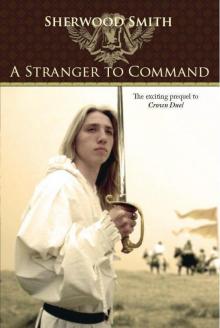 A Stranger to Command
A Stranger to Command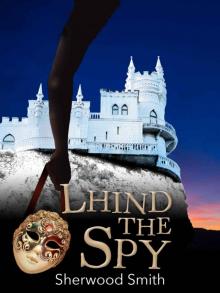 Lhind the Spy
Lhind the Spy The Spy Princess
The Spy Princess Blood Spirits
Blood Spirits Sasharia en Garde
Sasharia en Garde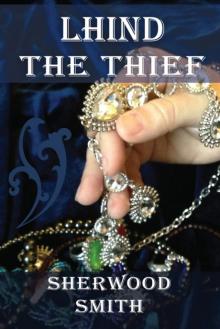 Lhind the Thief
Lhind the Thief Paradise Drift
Paradise Drift Banner of the Damned
Banner of the Damned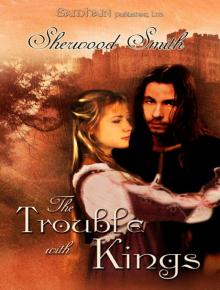 The Trouble With Kings
The Trouble With Kings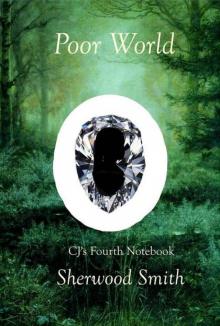 Poor World
Poor World Treason's Shore
Treason's Shore Wren Journeymage
Wren Journeymage A Posse of Princesses
A Posse of Princesses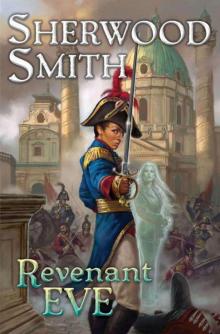 Revenant Eve
Revenant Eve Once a Princess
Once a Princess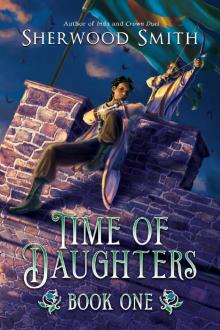 Time of Daughters I
Time of Daughters I Rondo Allegro
Rondo Allegro Coronets and Steel
Coronets and Steel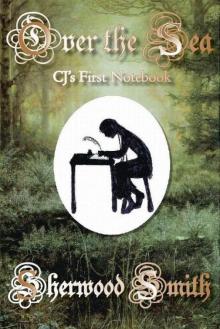 Over the Sea
Over the Sea Senrid
Senrid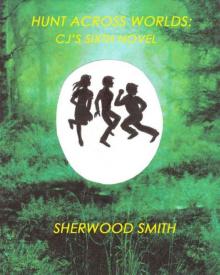 Hunt Across Worlds
Hunt Across Worlds A Sword Named Truth
A Sword Named Truth The Fox
The Fox Twice a Prince
Twice a Prince Fair Winds and Homeward Sail: Sophy Croft's Story
Fair Winds and Homeward Sail: Sophy Croft's Story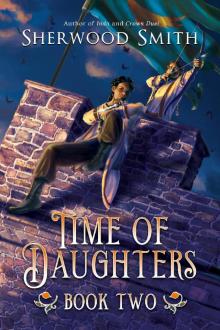 Time of Daughters II
Time of Daughters II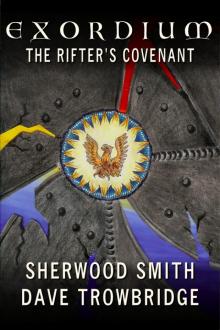 The Rifter's Covenant
The Rifter's Covenant The Phoenix in Flight
The Phoenix in Flight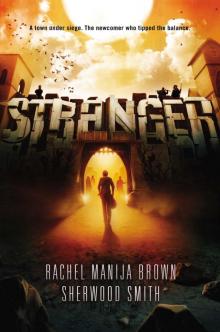 Stranger
Stranger The Thrones of Kronos
The Thrones of Kronos A Prison Unsought
A Prison Unsought Twice a Prince: Sasharia En Garde Book 2
Twice a Prince: Sasharia En Garde Book 2